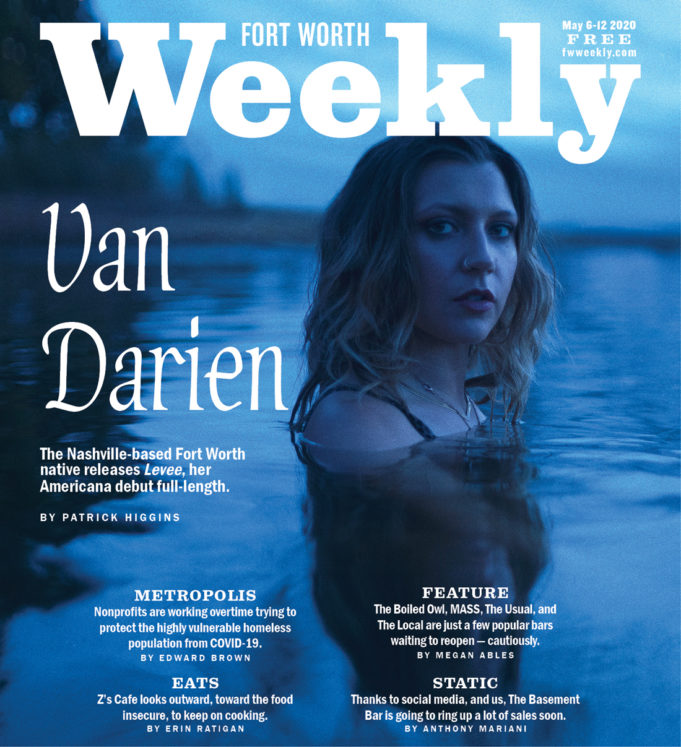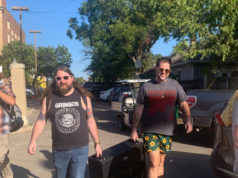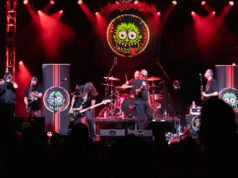Putting out an album in the middle of a pandemic likely can’t help but feel a bit anticlimactic. The many months (or years) of work spent writing, recording, planning, and conceptualizing the marketing and promotion which are involved in an upcoming release usually culminate in a rash of celebratory activity. Live performances, the courting of radio to spin the carefully chosen singles or an on-air appearance, seeing physical copies on shelves in stores, and even interviews with challenged but no less dogged and unwaveringly determined local alternative weekly publications (a’hem) –– these represent the flurry of momentum that typically surrounds an artist after the release of new music. Though she knew almost all of the payoff for all the work leading up would be denied, singer-songwriter Van Darien decided she still needed to do it.
It is “definitely strange to say the least –– I really had to think about it for a while,” Darien said of releasing an album while the world is in lockdown. “It’s kind of a selfish feeling because you’re asking people to pay attention to you while people’s lives are at stake. It’s a very conflicting feeling, but after talking to a bunch of people about it, they were like, ‘No, we need the music. We need the distraction. We need something to brighten our day.’ Even though it is a little bit of a somber record, there are things that are very happy about it –– things that take you to another world. I think it’s important to have that right now.”
Devoid of the usual pomp, on April 10, Darien released Levee, her first full-length effort. It joins a now-unavailable album she put out in 2009 and a prior EP (2014’s Silent Sparrow), but she counts Levee as her proper debut. It also represents her first new music since relocating to Nashville from Fort Worth five years ago. Darien said she feels the material on Levee demonstrates her development as an artist, highlighting what she describes as “much more of the writer side of me and [which] tells my story better” than her previous efforts.
The album, recorded over several months at Nashville’s Glass Onion Studios, is made up of 10 tonally diverse story songs that blend folk, country, and even indie-rock flavors. Darien gives credit to her producer/guitarist (and boyfriend of nearly eight years), Steven Cooper, for the way he helped craft and accentuate the tracks emotionally. She puts particular emphasis on his creativity for the broad spectrum of sounds that appear on Levee, like what she calls the “dying dinosaurs” solo on “Twisted Metal” –– sounds that are fairly foreign in most “Americana” music.
“He definitely had all of the say sonically, as far as the direction a song would take,” she said. “When I bring a song to the table, he’s very good about bringing out the emotion [the song is trying to relate]. For example, on ‘The Sparrow & The Sea,’ that’s a very emotional and dramatic song. But every time that solo comes around, somehow it magnifies those emotions even more than I could ever do vocally or lyrically.”

Photo by Curtis Wayne Millard
The title of the album is an allusion to Darien’s tendency to consistently reference images of water and metal in her lyrics. With songs like the title track, “American Steel,” and the aforementioned “Twisted Metal” and “The Sparrow & the Sea,” Darien finds herself subconsciously returning to these two seemingly disparate concepts again and again. The actual marrying of those two ideas into a single theme solidified when a friend reminded her of a line from one of her favorite songs. In the outlaw country classic “Highwayman” by the legendary country supergroup The Highwaymen, Waylon Jennings describes a place “where steel and water did collide.” With a “levee” being just such a place, Darien found her theme.
As well as Cooper’s fingerprints all over the album, Darien enlisted singer-songwriter Owen Beverly to perform the duet on “The Sparrow & the Sea,” and former Arlington native Maren Morris receives co-writer credits for “Twisted Metal” and the Tom Waits-ian “Low Road.” Perhaps the most surprising co-writer credit goes to Darien’s father, who penned the opening verse to one of the album’s singles, “American Steel.” Though primarily a welder and a mechanic, her father, she said, has always been creative with language and often writes poetry. She said that the experience of writing with her father is a memory she cherishes and is a particularly poignant example of the inspirations behind the album.
“I think it’s very special to have a song that I wrote with my dad,” she said. “Especially [because it’s] about things that last –– about things that survive long after we’re gone. This song will still be here long after we’re gone.”
It’s a sentiment that is not lost during these times, that no matter what is happening in the world, some things still have structure, are necessary, and survive.












